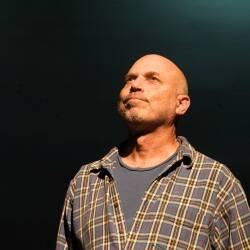With its simple set and complex story line, “Our Town,” written by Thornton Wilder took Broadway by storm in 1938. Fellow playwright Edward Albee called it the greatest American play ever written, and it opens at the San Juan Community Theatre Oct. 4.
“Our Town certainly makes a case for that, [being the greatest American play] as it continues to be widely produced a century after it first opened,” San Juan Community Theatre’s Artistic Director Nathan Kessler-Jeffery responded when asked whether he agreed with Albee’s assessment. “Themes of simplicity, joy, sorrow, and the fleeting nature of life continue to resonate. Do I agree with Albee? I don’t think I believe there is a ‘greatest’ American play—simply plays that are great.”
Directed by Margaret Hall, and starring a full cast of islanders, some new to the stage, “Our Town” takes place in the fictional town Grover’s Corners in New Hampshire. The audience watches as the citizens fall in love, raise families, and in some cases pass on. Small towns across America were very similar in the early 1900’s – before WWI, Hall explained when asked if she saw connections between Grover’s Corner and Friday Harbor. Prohibition, the Roaring Twenties, WWII, TV, women’s lib, computers, the internet, cell phones, social media, 9/11, have affected rural Americans in every state.
“The citizens’ daily life, which we observe in Act I, was simple. Men worked to support their families; women cooked, kept house and raised the children. When we get to the wedding in Act II, we’re reminded that despite the joy of ‘two souls uniting to become one.” Hall said. “There still exists a lot of confusion and hesitancy in everyone’s mind. In Act III we realize that life is short and death is inevitable for all of us, yet the Stage Manager/Narrator says, ‘There’s something way down deep that’s eternal about every human being.’”
Kessler-Jeffery also sees a connection between the two rural communities, even despite the different time periods saying “There is a tremendous resonance between the lives of the people of Grover’s Corners in the play and the lives of Friday Harbor residents. When Margaret Hall brought up the script, I went back to re-read it and was immediately struck by how relevant it remains.”
Love of theatre is one of the reasons Hall wanted to direct the play. “There’s nothing like live theater, and I love plays that belong on the stage – not in the movies or TV.” Hall explained. “‘Our Town’ is a play-within-a-play – the “Stage Manager” talks directly to the audience and controls the actors onstage; he’s presenting the play to us in real time; we’re part of the action.”
One of the things that makes ‘Our Town’ a classic, Kessler-Jeffery explained, is that there really isn’t a specific genre for it. “It is part family drama, part love story, part coming-of-age tale, part comedy, part…ghost story,” Kessler-Jeffery said. “What I find most specific about it is that it focuses on the simplest of events—and the triumphs and defeats of the everyday.”
For Hall, the plays timelessness comes from its ultimate message she said. “Every person ever born will eventually die, so we must all appreciate every moment we have on this beautiful earth.”
The two, Kessler-Jeffery and Hall, had wanted to tweak the script slightly to add an San Juan flavor, however, after contacting the publisher who immediately responded that the Thornton Wilder estate doesn’t permit changes of any kind to the script. “The only San Juan Island-ing that has happened has been the use of the actor’s names in the opening monologue. The rest of the script is word-for-word as Wilder wrote it,” Kessler-Jeffery said.
Not being able to alter the script was one minor challenge, according to Hall, “This is a long play in three acts, and copyright laws prevent us from cutting a single word,” she explained. To adjust the time, Acts I and II will be linked with only one intermission before Act III. “But, trust me, you won’t want to miss the end!” Hall said.
She added that there is no such thing as challenges, only opportunities, and there have been many successes along the way as well. “With the hard work of brilliant lighting, sound, set, costume amd prop designers, we have transformed ‘Our Town’ from a ‘high school’ play to a stunning, professional production. Just wait until you see it,” Hall said.
Hall has directed several plays at the Community Theatre over the years.
“Coming from a professional theater background, the first time I was asked to direct in community theater I was hesitant at best.” She recalled. “But I soon discovered the joys of community theater: Everyone is a volunteer; they’re there because they enjoy it, not because they’re being paid. We become a team. We cheer each other on, since no one is looking for their next job or competing with their fellow actor for a part. Plus – I love watching my friends and neighbors develop into wonderful actors!”
In Act I the audience meets many of the hard-working, ‘salt-of-the-earth’ citizens of Grover’s Corners circa 1901, Hall explained. Then in Act II, viewers watch Emily and George fall in love and get married. Then Act III takes attendees to the graveyard, where some of the friends we met in Acts I and II have now ‘passed on’.
“Even Act III is hopeful, inspiring and uplifting,” Hall emphasized.
Kessler-Jeffery reflected upon the plays uplifting sentiments as well. “Emily has a line in the third act, ‘Do people ever realize life while they live it?’ I find that tremendously poignant. I hope we leave this performance reminded that every day is a gift, and that investing in the people around us will always be a solid choice.”
Performances run Oct. 4-20. Tickets are available at www.sjctheatre.org.



